#‘age of dictatorships in Europe’
Explore tagged Tumblr posts
Text
The near future in the Doctor Who universe sure gets dire doesn't it? Especially if Mad Jack / Roger ap Gwilliam is still part of history.
I thought I'd have a bit of fun listing things out, combining as many sources as possible. Turns out he fits in shockingly well with what we know. There's a lot missing here or cut out, and for obvious reasons it's very UK / Europe focused, but nonetheless:

[ID: Scene from The Christmas Invasion showing Harriet Jones on BBC News. The news ticker reads "PM HEALTH SCARE", "Unfit for duty?", and references a "SECRET GOVERNMENT MOLE" and a quote: "BLOOD ON [HER HANDS]".]
2006-2021 (obviously the past now, but still noting for the resulting temporal and political butterfly effect) - In the original timeline, Harriet Jones remains Prime Minister for 3 consecutive terms, presumably 15 years assuming no snap election was called, referred to as a 'golden age' [World War Three]. The Tenth Doctor deliberately changes history to cause her deposal [The Christmas Invasion], leading to numerous disastrous terms in the meantime, including those of Harold Saxon [The Sound of Drums et al.], Brian Green (who tried to appease the 456) [Children of Earth], Boris Johnson (an auton host of the Nestene Consciousness) [Rose (novelisation)], and Jo Patterson (responsible for deploying cloned Dalek defence drones in the UK's streets) [Revolution of the Daleks].
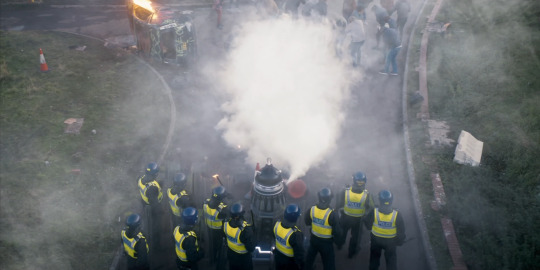
[ID: Scene from Revolution of the Daleks. A 'defence drone' Dalek is used to support anti-riot police in a test, dispersing protestors with mock tear gas.]
2010s-2030s - The European Union gradually integrates further, eventually becoming the European Zone / Eurozone, a global superpower which competes with the USA through the 21st century. The UK eventually forms part of the bloc [Trading Futures].
It's likely that Harriet Jones's deposal led to this and related events being delayed or erased, with Brexit (driven by, among others, one of Jones's successors in the new timeline) reducing european unity. Most notably, Ramón Salamander's rise to power occurs now not in the 2010s [The Enemy of the World], but in the 2030s [Doctor Who and the Enemy of the World]. There are other events that are seemingly delayed by ~20 years by changes to the timeline, including future events like the dictatorship of Mariah Learman [The Time of the Daleks, Trading Futures], and yet also possibly past events like the death of Queen Elizabeth II [Battlefield, The Longest Night et al.], which may suggest something else (eg. the Time War) may be responsible.
~2030 - During a time of rising global tensions [73 Yards], Ramón Salamander convinces a group of scientists in an underground shelter endurance experiment that nuclear war has broken out on the surface. They are convinced to generate artificial "natural" disasters to fight back against the enemy. Between this and ongoing climate change, several global food sources collapse as a result, including Canada and Ukraine's corn and flour production [The Enemy of the World].
2031 - Tensions culminate in the "Great Russian War". Despite posturing, not a single nuclear weapon is fired, at least by NATO [73 Yards]. This may be later considered World War III [Trading Futures].
~2032-2035 - Following the war, tensions rise again, now between the Eurozone and the USA [Trading Futures], possibly in reaction to actions (or lack thereof?) taken by NATO during the war [73 Yards]. Both send separate peacekeeping forces to conflict in North Africa. Meanwhile, Italy is engaged in civil war [Trading Futures].
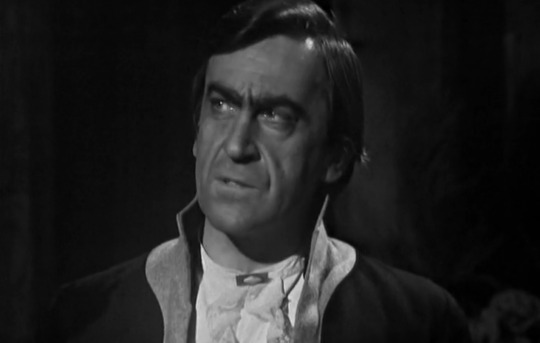
[ID: Scene from The Enemy of the World, showing Ramón Salamander.]
Over the decade, Ramón Salamander rises in power in the World Zone Authority, using his patented "Sun Store" satellite technology to aid the growth of crops by controlling sunlight over agricultural regions. In the background, he murders and blackmails officials to place loyalists into powerful positions, with the goal of ruling over the World Zone Authority as a dictator. Salamander's treachery is later discovered and he disappears [The Enemy of the World].
2037 - 2042 - Several militia declare wars of Independence from the USA. Notably, Phoenix, Arizona is destroyed in a terrorist attack. While the country largely persists after the conflicts, some territories seem to successfully secede - with, for example, a Montana Republic seemingly being in existence in 2054 [Alien Bodies].
2038 - The World Zones Accord is signed. This is later considered to have reduced the United Nations to a 'joke' compared with the World Zone Authority [Alien Bodies]. Given the extensive power it gives to the WZA, this was likely originally part of Salamander's plan, but due to his disappearance he is not around to reap the rewards [The Enemy of the World].
2039 - A group of Mexican astronauts studying minerals on the Moon go missing [Kill the Moon].
~2030s - 2040s - The Earth begins to experience major climate change effects, including "appalling storm conditions" which harm agriculture [The Waters of Mars]. The ice caps melt and flood much of the Earth [K9] with nations like the Netherlands ending up entirely flooded [St Anthony's Fire]. Some regions experience corrosive acid rain [Cat's Cradle: War Head, Strange Loops]. One summer sees Britain experience a 22 week drought. At this time, the Eurozone closes its borders to millions of North African and Baltic Sea refugees [Hothouse]. This time period may be known as the "Oil Apocalypse" [The Waters of Mars].

[ID: Scene from K9 Episode 13: Aeolian. Big Ben stands in the middle of a colossal storm of wind and rain.]
With Earth's ecosystems collapsing [Davros], humanity begin to realise it's facing extinction [The Waters of Mars]. An artificial cooling agent is spread in the atmosphere to semi-successfully combat the effects, but leads to dramatic side-effects, including freezing some areas of the globe. This is known as the "Great Cataclysm" [K9].
2041 - A three-human team, including Adelaide Brooke, lands on Mars for the first time [The Waters of Mars]. However, with this accomplishment, and increasing turbulence on Earth, Humanity gradually loses interest in space exploration [Kill the Moon].
Before 2045 - Around this time, the UK falls into a dictatorship ruled by the "Director", head of a military council that has allegedly (secretly?) controlled the government since 2028 [Britain Protests]. It is possible that this Director was previously the "Minister of War" for previous governments [Before the Flood].
2045 - The World Zones Authority evolves into a World Government, with Nikita Bandranaik being elected President. The UK is not part of the organisation [This is 2065].
2046-2050s - The Director is overthrown [Down with the Director] and the rest of the government "collapses in shame" [73 Yards]. Some of the revolutionaries celebrate now being "masters of [their] own country" [Down with the Director]. Despite the hopes of the World Government for international integration, this nationalistic streak continues.

[ID: Scene from 73 Yards. Roger ap Gwilliam, with an Albion Party ribbon on his chest declares victory on BBC News, live from Kennington High in London. Headline reads "LANDSLIDE VICTORY FOR ALBION PARTY: Majority of 92 predicted. Roger ap Gwilliam declared Prime Minister."]
Roger ap Gwilliam is elected Prime Minister, with the far-right nationalistic Albion Party gaining a majority of 92 MPs [73 Yards]. While his government does take the step to officially join the World Government senate [Down with the Director], he seeks greater independence from other nations. One of his first actions is to expand the UK's nuclear arsenal, purchasing missiles from Pakistan and withdrawing from NATO. In his term, the world is brought to the brink of nuclear war [73 Yards], likely in the pre-2050s "Euro Wars" [The Time of the Daleks].
In this time, the "Department", a (private?) multinational security organisation is born, based primarily in the UK. They gain broad powers, which they use to control populations with propaganda and use of "CCPC"s: robotic law enforcement notorious for their surveillance and brutality. Despite its recent revolution, the country is rendered practically a police state [K9].

[ID: Scene from K9 Episode 1: Regeneration. CCPCs, hulking police robots, march down a dark alley.]
2049 - The Moon starts to dramatically gain mass, causing massive tides on the Earth, flooding entire cities. In a last ditch at survival, humanity plans to try and destroy the Moon using an array of nuclear bombs. Despite the people of Earth being offered the vote on what to do by turning off their lights, it appears the decision is made on a national level, with lights going off grid-by-grid. Nonetheless, the Moon is allowed to hatch, leaving behind a new less massive egg "moon" with minimal further destruction [Kill the Moon].

[ID: Scene from Kill the Moon. The Moon hatches in the background, as the TARDIS stands by the sea.]
Humanity's interest in space exploration returns [Kill the Moon], starting a new space race. Among these projects, Australia begins constucting a space elevator, Spain a project called "SpaceLink", while Germany and Russia each begin a series of new Moon missions. The Philippines are rumoured to be planning their own landing on Mars [The Waters of Mars].
~2050 - The UK Government (ap Gwilliam's?) is couped once more, by General Mariah Learman. With the King's permission, elections are suspended for at least a couple years, with her ruling over a "benevolent dictatorship". She is later abducted and forcibly mutated by the Daleks [The Time of the Daleks]. Despite the previous description, her promotion of Shakespeare in schools is remembered as the only good thing about her rule [Trading Futures]. (Note: As mentioned prior, it's likely that Learman's rule may have been delayed as Salamander's was. This is suggested by the mention of her in Trading Futures, set seemingly ~2030s or earlier, despite The Time of the Daleks taking place around the 2050s.)
~2050s - The Gravitron is built on the new Moon. This is used to artificially control the tides and weather [The Moonbase]. It likely also is intended to study and monitor the new Moon for future changes [Kill the Moon].
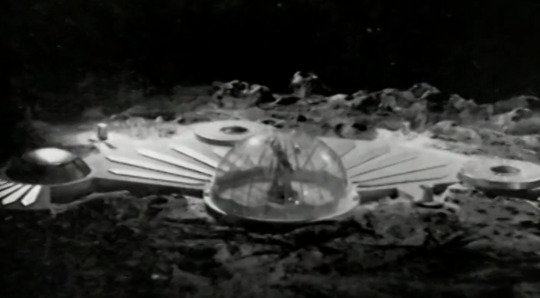
[ID: Scene from The Moonbase, giving an external shot of the base.]
2058 - 2059 - Bowie Base One is established: humanity's first colony on another planet and an international collaboration between the UK, USA, Russia, Germany, Turkey, South Korea, Lithuania, Australia, and Pakistan. One year later, it is mysteriously destroyed in a deliberately triggered nuclear explosion. In the original timeline, there were no survivors. However, after the interference of the Time Lord Victorious, the true story is eventually told on Earth. Regardless "a veil of darkness" sweeps over the planet over the next few years. [The Waters of Mars], as international tensions heat up once more... [Total Eclipse of the Heart].

[ID: Scene from The Waters of Mars, showing an internet news website. Various articles appear focused on the Bowie Base One incident, including "SURVIVORS STORY - BROOKE SAVED EARTH", "THE MYTHICAL DOCTOR", "BROOKE'S HEROIC ACTIONS SAVE EARTH", and "HOW THE COUPLE ESCAPED MARS". The feature image shows the two survivors: Yuri Kerenski and Mia Bennett.]
2060s - The "Great War" breaks out on Earth, involving every country on Earth. This is likely World War IV. Details are vague, but it ultimately ends in a ceasefire, when it's realised the conflict is risking Earth's habitability [Total Eclipse of the Heart].
381 notes
·
View notes
Note
catalan is such an interesting language, but i'm curious as to how it originated/why it's so heavily centered in areas around bcn and what the stigma is around speaking catalan and/or spanish (in the catalan region).
and who of our current squad speaks catalan? i've only ever seen/heard of aitana using it
well, catalan is a romance language, just like french, italian, portuguese, spanish, etc., meaning that these languages all have their roots in vulgar latin. remember that the romans spread their language and culture throughout europe, and catalan is spoken in parts of spain, andorra, parts of france and some other areas.
and if you look at the map of europe, all of these languages have geographic proximity to one another. so naturally it makes sense that they would evolve in this matter if they share the same vulgar latin origin. because migration occurs and then groups of people settle in places and variations develop between these languages.

and you should really research spanish history because the topic of discrimination against the autonomous communities in spain is a lot to cover than i can possibly do justice to in one post. but essentially there has been widespread discrimination against autonomous communities in spain like the basque country and catalunya for ages, including discrimination against locals speaking their language, such that there was real risk that these languages would be lost. the discrimination was intensified during the dictatorship of franco. there are debates about how far the stigma against speaking catalan goes back but it's origins arise in spanish nationalism in which spanish/castellano is viewed as the language of the state. and that means spanish is the only language that should be spoken. this view exists today, and that's why there is still hate towards aitana when she speaks catalan (like during her ballon d'or acceptance speech! 🙄)
as to who speaks catalan, all of the players born in catalunya and the balearic islands would speak or at least understand catalan. and some of the players who have lived in barcelona for a long time will also understand and speak to some degree catalan.

and you haven't heard alexia speak catalan, really? 😂 she speaks it at all official events for barça as our team captain.
youtube

yes, both catalan and spanish are taught in schools in spain (as is english to a lesser degree) but most subjects are taught in catalan unless you go to a private school. most everyone in catalunya will grow up speaking catalan and spanish. also, so much pop culture is in spanish anyway, so you also get spanish exposure outside of school, through music, tv, film, etc.
in fact, most of the players who grew up in autonomous communities are bilingual. irene is from basque country and her mother language is basque. aitana, pina, alexia and others speak catalan.
#alexia putellas#catalan language#catalan#spanish culture#spanish history is fun#fcb femení#futfem#woso
42 notes
·
View notes
Text
I Feel You Linger In the Air

You ready for this?
The quickest of quick thoughts: I loved this show and hated the ending, but not for the reason you think.
This is gonna be one of my big meta beast-sized posts, skip to the end for the final review.
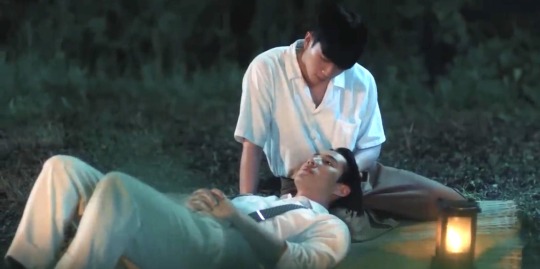
Some Historical Context for I Feel You Linger In The Air - Thailand 1925-1932
I love history and so here's some info that any Thai watcher would likely know, but the rest of us might not... ready?
The Historical Stage:
Burma (now Myanmar) to the west is occupied by the British.
The French hold Vietnam to the east.
Everyone is bickering over what would become Cambodia & Laos.
China occasionally gets involved from the North (also, lots of immigrants from China at this time accounting for a large percentage of the merchant/middle class)
Eventually, Japan would invade during WWII.
In part, The Kingdom of Siam was kept a "neutral" party because none of the surrounding colonial powers wanted to risk offending any of the other players in the area.
Siam re-negotiated sovereignty in 1920 (from USA) and in 1925 (from France & Britain). But during the time of this show (late 1929) it was back to it's customary type-rope balancing act of extreme diplomacy with the allied western colonial powers that surrounded it.
Recognizing that Thailand was never colonized (although it was invaded), it's boarders were constantly nibbled at and it was "ambassador-occupied" off and on by westerners whose military backing and exploitive business concerns simply outmatched the monarchy, especially in the technology department (as well as by reputation on the global stage at the time).
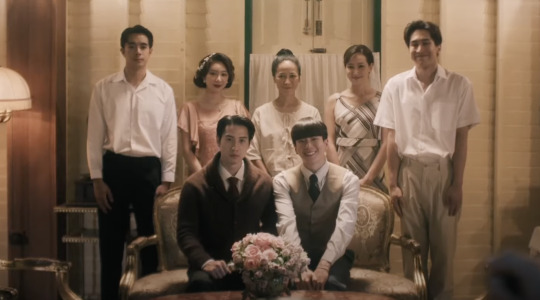
In other words, the farang in this show (James & Robert) were always gonna be both the baddies and the power players of the narrative. (Farang is the Thai word for non-Thai's of European descent, the word means guava.)
The king of Siam at the time (Vajiravudh AKA Rama VI) was initially somewhat popular but also regarded as overly extravagant since Siam had been hit by a major postwar recession in 1919. It should also be noted that King Vajiravudh had no son because he was most likely gay (which at the time did not much concern the Siamese popular opinion, except that it undermined the stability of the monarchy leaving it without an heir).
He "died suddenly" in 1925 (age 44) with the monarchy weakened and succession handed off to his younger brother.
In 1932 a small circle of the rising bourgeoisie (all of whom had studied in Europe, mostly Paris), supported by some military, seized power from the monarchy in a practically nonviolent Siamese Revolution installing a constitutional monarchy. This is mentioned in IFYLITA in the last few episodes but did not (apparently) appear in the original novel.

Siam would then go through:
dictatorship,
WWII,
Japanese invasion,
Allied occupation,
democratic elections,
military junta,
the Indochina wars,
communist insurgency,
more democracy and popularization movements,
multiple coups,
more junta,
more monarchy,
eventually leading us to the somewhat chaotic insanity of Thai politics we have today. (Which is, frankly, a mix of monarchy, junta, democracy, egocentric popularism, and bribery.)
The Filming of I Fell You Linger in the Air
The director if this show, Tee Bundit (Hidden Agenda, Step by Step, Lovely Writer, TharnType), has never particularly impressed or offended me as a director. I would have called him simply "workmanlike" in execution: not offensive, serviceable.
So much so that I spent some time hunting for info on IFYLITA's cinematographer (who remains uncredited on MDL) because this one, of all Tee's pantheon, is ultra stylish. It, frankly, felt too good for him.

Specifically, there is a repeated visual motif in intimacy scenes of either Yai or Jom being filmed from behind a screen/drape/curtain making them seem more translucent, like a ghost or spirit. While the other half of the pair is filmed with sharp clarity. In the first half of the series this is more likely to be Yai (an unknown and mysterious element), as the show progresses, it's more likely to be Jom (the person outside of place and time, destined to vanish all together). This cleverly conveys story, tension, and foreshadow (future shadow?)
Occasionally we shift over so they both become obscured and then clear again.

This stylized version of dirty framing and filters is used to foreshadow and then constantly remind us about that Jom slipped (and is slipping) through time and the disconnect that causes to his sense of reality and purpose, and to his burgeoning relationship.
For example, the scene where Yai is drunk and asleep in his bed. The first time Jom is sitting in a chair drawing him. Yai is blurry behind the screen while Jom is solid and sharp.
This filming technique combined with dirty and peekaboo framing is being used to give the watchers the impression of looking at something we maybe shouldn't, like we are being creepy and intruding on their private time. After all, they can see EACH OTHER clearly, it's only us who have the visual impairment.
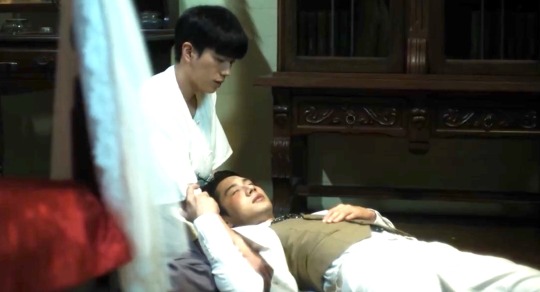
This gives us a sense of doom and discomfort and slight sensation that we shouldn't be there. We shouldn't be watching. But ALSO that we too are outside of time, filtered by the future.
In other words his sense of displacement is being used to trigger ours visually.
It's all quite clever.
It's both beautiful and atmospheric and discomforting and touch stressful. Meaning that it is ALSO a visual vehicle to drive narrative tension. As effective as scary music, perhaps more so in this show (since I personally found the musical motifs and refrains somewhat overused.)

Linguistic corner
The word for reflection and shadow is the same in Thai.
Note on the por/phor/phô honorific in Thai
I have not encountered it before in BL. I am indebted to @embraceyourfandom for the following information;
Phô is a paternal honorific, luang phô is used for respected monks. It basically means father. And is oft seen as male honorific for village elders. It's also used as a male prefix in the names of several occupations like:
พ่อครัว phô khrua (khrúa= kitchen -> chef)
พ่อค้า phô khá (khá= trade -> merchant)
พ่อมด phô mót (mót= person of occult knowledge -> wizard)
พ่อบ้าน phô bân (bân =house -> butler) - most relevant
So, Yai's use is probubly foreshadowing that Jom will be a butler for his house, and is primitively referring to him with this title.
All that said, phô can also be used by a "man who is older/higher on hierarchy to refer to a younger/lower on hierarchy man with intimacy and/or affection."
I think all this has to do with Jom's demonstration of education. Yai figured out early on that one of the reasons Jom doesn't belong and cannot fit in with the servants is that he is more educated than a peasant (of this time period), which for Yai adds up to him being originally from a higher status and possibly wealthy family, especially since Jom speaks English and has travelled (he has a non-northern accent).
There is very little Thai middle class at the beginning of the 1920s since trade is being dominated/dictated by the West, or Chinese merchant operations, and Siam is a monarchy. So for a nationalize Thai citizen educated means military, landed gentry with trade operations (like Yai), royal/political/diplomatic connections, or... none of the above. This changes, especially in the south, throughout this decade (as it did in other parts of the world). So there is a rising bourgeoisie going on in the background but it's not that obvious in Chang Mai at this time.

What Jom's educated lack of status means to Yai is that Jom's family either got wiped out or politically disenfranchised possibly as part of the 1912 attempted coups (or even WWI)? This would be mystifying for Yai because Jom doesn't act like he comes from a military family at all. So his background and status is very confusing for Yai, but Yai does know one thing...
Jom is NOT lower class by the standards of Yai's temporal worldview and existence.
For a young man to be educated and yet entirely alone is very dangerous and suspicious. Also, let's be clear, Jom doesn't look or act like a laborer. He red flags "cultured" all over the place.
Yai is paternalistic and caring towards Jom out the gate because Yai has a big ol'crush but also because he recognizes "his own" is trying to survive while isolated and scared.
Yai wants to rescue Jom. Yai is an ineffectual 20 year old gay intellectual. But poor thing sure tries.





Let's Talk About How I Felt About I Feel You Linger in the Air
The historical aspect was great.
I adore historical romances and we almost never get them in BL. I was always gonna be biased towards this show. (As indeed I am towards Nobleman Ryu's Wedding, Tinted with You, and To Sir With Love.) Aside from some classic Thai BL production issues (less than normal, this is very high production value for Thailand) and my issues around the sound track and repetitive repriens (which frankly were more noticeable because I binged the last half) I have no complaints on that score (heh heh).
The surrounding support cast were all quite good and we even got us some lesbians!

The emotional and narrative tensions were excellent.
Any issues I had with pacing came from focus on characters that didn't interest me, but probubly did interest others. I wasn’t wild or particularly interested in the family drama or the side characters/couples, but they were necessary to make this a fully fleshed story with historical context and to give Yai much needed characterization. Also this use of a ensemble cast is very close to Thailand's lakorn heart, even thought this one had way less scenery chewing ludicrous soapy drama (thank heavens).
I was delighted that external threat, stressors, and conflict drove this plot. That's refreshing in BL.

I have no arguments with the chemistry and kisses and sex scenes were tasteful and lovely, occasionally even heart-wrenching, and it's nice to see Thailand especially use physical intimacy to drive plot, and not the other way around.
I love historicals partly because every tiny touch can have such lingering significance, they're very elegant in their chaste physicality. This show didn't need to move into higher heat, but I'm grateful it did because even that was very well done. Thai BLs can often feel clumsy around intimacy, but not this one.
The final sex scene before Jom and Yai separate forever utilizes the ubiquitous director's-favorite-romantic-moments-flashbacks (required of all Asian romance dramas) but with acceleration and tension driven by the noises of sex, which I've never seen/heard done before. In other words: climax of sex = climax of the romance story, I see what you did there, Tee. Clever. Very clever. Bit on the nose… erm�� on the… well you know what I mean.

Like all Thai BLs this wasn’t perfect, but for me this is as close as Thai BL gets to high quality romance and that’s what I want the most from my drama watching experience (if not necessarily my Thai BL experience).
But... and you knew the but was coming didn't you?
I absolutely hated the ending.
It wasn't sad, don't worry, but it also wasn't good.
There is a long drawn out separations sequence and then Jom returns to the present, drowning from a car accident. Jom is "rescued" by an moustachioed iteration of Yai from the distant past (who we met once before) and then wakes in hospital. Some time later, Jom returns to the house in Chang Mai where Yai turns up and they reunite.

The end.
There is a stinger featuring Jom once more hurled back in time, only further, meeting the warrior mustache Yai once more.
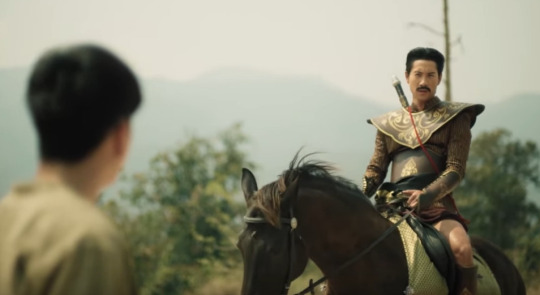
Okay, that's all I knew and all I saw.
Confused? So was I.
If this had been a regular time travel romance: Yai would have been the EMT or doctor attending Jom when he woke up and their "this time period" romance would commence. With either shared memories, or not.
Had this been set up for audience comprehension in line with the original novel, we should have had flashbacks from both Present Yai (he's not the same one, as it turns out) and deep-past Moustache Yai interwoven throughout the series. Preferably with some focus on Present Yai's quest for reunion with Present Jom AND Present Yai's own experience with visions and memory of his past lives.
A full explanation of the ending is here. This explanation of the 3 different Yais makes me like our ending more. But I shouldn't need to read Cliff's notes from some random y-novel reading fan on Tumblr to understand what's going on in a series!
There is supposedly a special happening with Jom + Present Yai.
There was unquestionably a failure in adaptation in the finale of this show.
As a fan and watcher, what I actually felt was deeply confused and hurt.
I also felt that this was a disingenuous un-earned throw away happy ending, since I had no idea who this new Present Yai was and no investment in his character. I simply didn't believe he was the same Yai (Bright is too good an actor, he was clearly a different older personality).
So the fact remains that past Yai, our Yai, the 20 year old boy we grew to understand and love, is abandoned in the past to suffer alone for the rest of his life. And THAT is an unhappy ending for one half of my beloved pair. Yes Jom gets a new Yai in the present day, but it's not the same Yai. They have no developed relationship, and Jom is doomed to leave even this new Yai and slide into the past once more. That's barely even happy for now for Jom's character.
As a result of my deep sadness for 20-year-old Yai in particular, I'm not going to be able to rewatch this show. The whole thing was rendered not just confusing but the opposite of comforting by the final 15 minutes. I'm tempted to dock it two whole points - one for the ending and the other for the lack of rewatch potential.
But the first 11.5 eps were SO GOOD.
This is one of the only times where I am actually hoping for a second season, while simultaneously being wary of the screen writing and production team's capacity to give us a satisfying one.
Industry wise? I honestly don't think we can hope too hard for a full season 2. This was an expensive show with flawed/limited distribution and little sponsorship. I don't see how they'll get funding for a second season. Unless we see this show up on like Netflix or Viki, I urge you not to hope too hard and be disappointed.

In all honestly?
I started typing up this blog post thinking Thailand was finally, after 5 years, going to earn another 10/10 from me but I just can't in good conscious give it that. It's been days and I'm still upset about that last episode.
And Now My Quick Pitch Review
I truly loved this time travel romance. IFYLITA is an exquisite BL, from filming techniques to narrative framework (much like Until We Meet Again). Steeped in history and family drama it edges into lakorn (but no as much as To Sir With Love and with way less scenery chewing). This is an elegant and classy BL... from Thailand which normally doesn't even try for classy. The main couple (both as a pair and individuals) were excellent, particularly Bright (Yai) whose eye-work acting style is a personal favorite of mine. Pity about the ending. Oh it wasn’t that sad but it wasn’t good either. This show should easily have earned a 10 from me except that it fumbled the… erm… balls. Argh. Whatever. 9/10
(source)
This post is also in My Drama List as a review.
#I Fell You Linger in the Air#Thai BL#BL review#I have LOTS of thoughts#Filming analysis#historical context#lanaguage and lingsuitic use#BrightNonkul#YaiJom#Tee Bundit
141 notes
·
View notes
Note
This is a random question, just because I'm curious, but you don't need to answer if you don't feel comfortable. I think you've mentioned before that you know people who have been into cults, who lived in vulnerable situations, or people who are from a higher social class. And I was wondering, how do you know so many people from different backgrounds? Is it because of your job as a lawyer?
Phew, well, I’ve had a bit of a turbulent time in my twenties and I’ve done a lot of things just for the plot xDDD
But honestly, it’s more logical than it seems. I studied in a Catholic school, and here in Spain it’s quite common that within Catholicism in general, there are people who belong to ultra-conservative groups that are basically cultos (like Opus Dei, the Kikos -Neocatechumenal Way-, the Legionaries of Christ…). These people are usually connected to far-right parties or elites because, in fact, they were once very close to and key financial supporters of the Dictatorship, but that’s another story. The point is that I went to school with kids whose parents belonged to these groups, specifically the Kikos and Opus Dei. I even had a teacher who was in the Kikos and had 15 children and refused to teach the section on sex education and STD prevention in Biology because he said “that’s not interesting” (basically because his sect forbids it lol). So yeah, I coexisted with those people.
Then in university, one of my best friends came from an Opus Dei family and she was a lesbian, total drama. I also had a friend I met around that time who ran away from home at 17 because she couldn’t stand her parents anymore and almost committed suicide (her parents were Kikos). So, for one reason or another, I’ve known people dealing with families in cults. Catholic school is an experience, to say the least.
Later on, I got involved in political groups from a very young age. I started participating in youth unions when I was around 15, and there you met all kinds of people, especially when you joined assemblies with other unions or went to meetings, etc. And you'd see everything from the rich kid playing progressive who doesn’t get anything, to people from very humble backgrounds for whom political struggle was something vital and personal. I joined feminist activism groups once I got to university and I don’t know, I was very active. I’ve traveled a lot around Europe too, and then through work, of course. Because of my job, I’ve met people who’ve really been through hell, who’ve made a lot of mistakes in life and lived extremely precarious existences. So I think all of that adds up, really. In general, I just tend to connect with the weirdest people I can find.
8 notes
·
View notes
Note
Was curious if you have any interesting information on L’Hospitalet de Llobregat?
I moved about a year ago, and I am about to sign up for my first Catalan class with the CNL soon. Since I do not speak Catalan yet and have limited Spanish, a lot of information I come across for my new home is not accessible to me.
Thank you in advance, and for you write on here in general. It is a great resource.
Thank you! And best wishes for the course with CNL, I hope you enjoy it!
L'Hospitalet de Llobregat is the 2nd most populated city in Catalonia and has the most densely-populated neighbourhood in all of Europe (Torrassa and Collblanc neighbourhoods). I'll shorten it to L'H from now on.
There's archaeological evidence of population in what nowadays in L'H since the Paleolithic (hunter-gatherer communities in the Prehistory), Ancient Iberian (the indigenous people who lived here before the Roman invasion), and the Roman era.
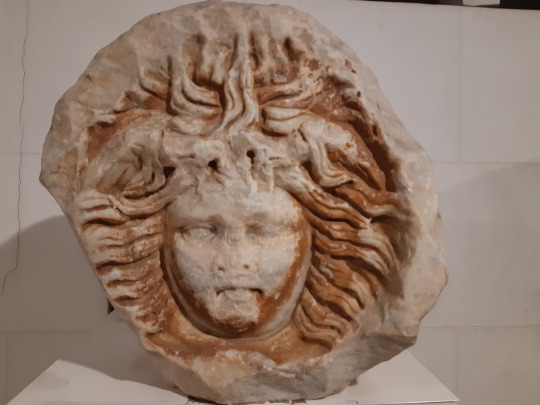
Ancient Roman head of Medusa known as "Medusa de Provençana", found in an excavation next to the Santa Eulàlia de Provençana church in L'H. Nowadays it's exhibited in the Museu d'Arqueologia de Catalunya, Barcelona.
The origin of the city as we know it now dates back to the Middle Ages. It originated as two entities: the older Provençana (which we have written records of since around the year 900, and was found around Sta Eulàlia de Provençana) and the later Hospital de la Torre Blanca ("Hospital of the White Tower", from around the year 1100, what is now barri del Centre). The second one was a hospital not in our modern sense of a place to take care of the ill, it was a house for helping poor and homeless people, probably founded by the Knights Hospitaller. It grew in population and ended up becoming more important than Provençana, and eventually the name that designated the whole area was changed from Provençana to L'Hospitalet (meaning "The Little Hospital" in Catalan).
But throughout all of these centuries, L'H was a very rural town with a small population (as an example, it had about 900 inhabitants in the year 1815). The population grew when an irrigation canal was built that allowed the fields to be way more productive, reaching 5,000 inhabitants around the year 1900. But the population boom came in the 1960s and 1970s, during the Francoist dictatorship, when many immigrants from different rural parts of Spain moved to the big cities to work in the industry. That's when the areas around Barcelona were quickly built up in these massive apartment blocks to make the "bedroom cities" from where the newly-arrived workers commuted to work every day. The population boom was so huge that it explains why L'H is the 2nd biggest city in Catalonia and so densely populated.
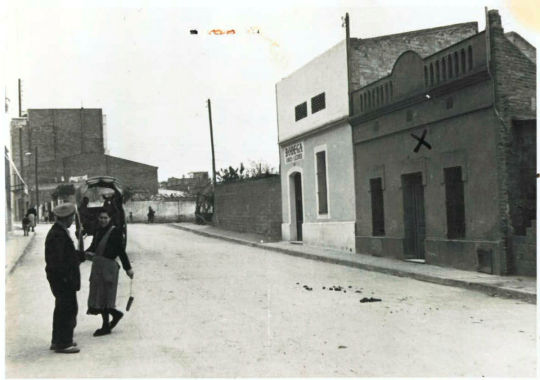

Carrer de la Florida in 1956 vs 2024. (L'H city archive / Google Maps).
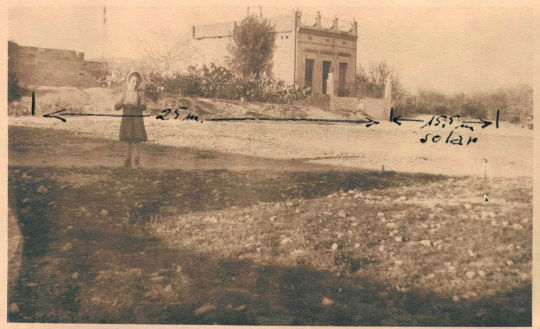

Carrer de la Renclusa, 84, in 1955 vs 2024. (L'H city archive / Google Maps).


Carrer de la Mina, 19, in 1956 vs 2024. (L'H city archive / Google Maps).
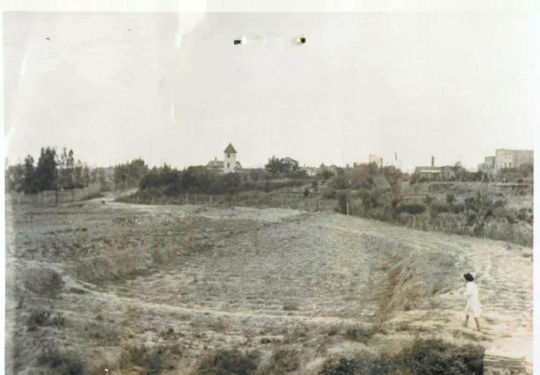

Avinguda del Torrent, 78, in 1956 vs 2024. (L'H city archive / Google Maps).
These "bedroom cities" had been built so quickly, that they didn't have any services. The inhabitants had to fight for all the services they have, which created a strong sense of pride that still continues nowadays.
As another note, one of the most famous maquis (anti-Francoism guerrilla fighters) was from L'H: Quico Sabaté. You can read about him on Wikipedia here. Another famous person from L'H is Ferran Adrià, one of the most famous chefs in the whole world.
I hope this was interesting, and I hope you can make the most of the Catalan classes, it will surely help you understand the country more and get better perspectives for a job.
23 notes
·
View notes
Text
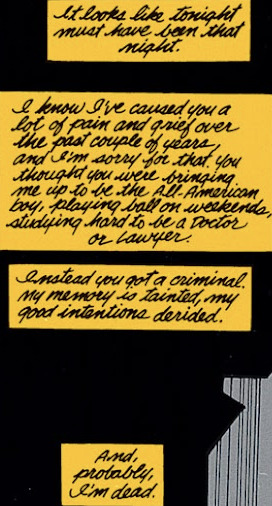






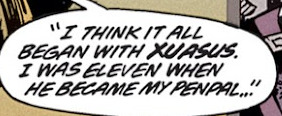
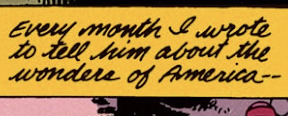





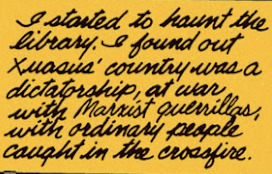










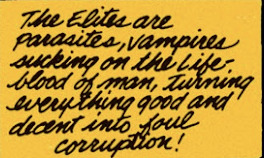
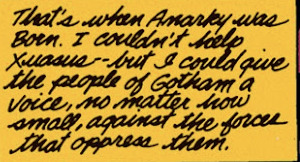
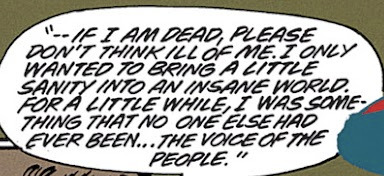

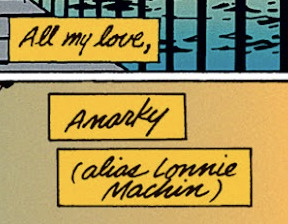
Lonnie's 'in case of my death' note from shadow of the bat #41 which according to @lesbiananitafite reads a hell of a lot like a suicide note because he is Not Normal, written out below because it is so hard to read as is:
It looks like tonight must have been that night. I know I've caused you a lot of pain and grief over the past couple of years, and I'm sorry for that. You thought you were bringing me up to be the All-American boy, playing ball on the weekends, studying hard to be a doctor or lawyer. Instead you got a criminal. My memory is tainted, my good intentions derided. And, probably, I'm dead.
How to begin to explain how I feel? The world is like an alien planet to me, the brittle laughter and hollow fun of a theme park overlaying the nightmares of war and discrimination and brutality. The people society respects-- the great and the good-- are, in most part, the small and the evil to me. It's as if I see with laser eyes, burning away the surface illusions that hide the fact that we're zombies-- puppets controlled by somebody else. Again I'm sorry, because I know you're upset. You're good people-- nearly everybody is good people-- and that's what the elite take advantage of. But society is changing. The information revolution allows every man to see the great and good are no better than him. The old power structures and their fascist ways cannot compete with the anarchy of tomorrow's technology. The time of the common man is coming. No longer will he have to march to battle as fodder for bankers and arms makers. No longer will he live in a fog of deceit stoked up by politicians' lies. The future is freedom... and all I ever wanted was to hasten its birth.
I think it all began with Xuasus. I was eleven when he became my penpal... Every month I wrote to tell him the wonders of America-- Every month he wrote back with tales of hovels and soldiers and the brutal repression that made up his life. After a year, his letters suddenly stopped. Mine were returned "Not Known." Another year passed before I found out why he Xuasus wrote once more, a single sheet scribbled in some seedy back alley. His father had been arrested and not heard from since. His mother took ill. His sister died of malnourishment. At the age of 11, Xuasus was fending for himself on the streets. Remember I asked you to help me find him, Dad? You said it was another country, the rules were different there. We could do nothing. But I couldn't just forget a friend like that. I started to haunt the library. I found out Xuasus' country was a dictatorship, at war with Marxist guerillas, with ordinary people caught in the crossfire. I found out the guns came from Europe, and Russia... and here. A few men made big profits, while half a world away, poor people suffered. I read about war and the history of war, and the psychology of war, and the horrors of war. You never knew it but--
That's when I went through those months of nightmares. Remember? Anyway, I soon realized something-- almost all wars were caused by only one man, or one small group of men. And every time the elites ordered 'Fight!' it was the ordinary men who became canon fodder-- and ordinary families followed him into oblivion.
I learned that the state is more important than the individual. I learned that politics is soaked in blood. But I couldn't accept that it had to be that way. Remember how crazy I was about books, Dad? I used to make you take me to the bookstore every Saturday. Flying saucers, cults, conspiracy theory, religion, the occult... I drank it up, tried in vain to make sense of it all. Then I discovered Scudder Klyce's "Universe" and the jigsaw finally fell into place.
Scudder Klyce worked out the secret of humanity. Vox populi, Vox Del. The voice of the people is the voice of God. The elites are parasites, vampires sucking on the life-blood of man, turning everything good and decent into foul corruption! That's when Anarky was born. I couldn't help Xuasus-- but I could give the people of Gotham a voice, no matter how small, against the forces that oppress them.
--If I am dead, please don't think ill of me. I only wanted to bring a little sanity into an insane world for a little while, I was something no one else had ever been... the voice of the people. One day-- and it won't be long-- the tyrants will die away, scorned and mocked by their former victims. One day you'll see that I'm right; maybe then you'll be proud to say "My son did that."
All my love, Anarky (alias Lonnie Machin)
102 notes
·
View notes
Text
Filipino Priest Who Defied Duterte Passes Away
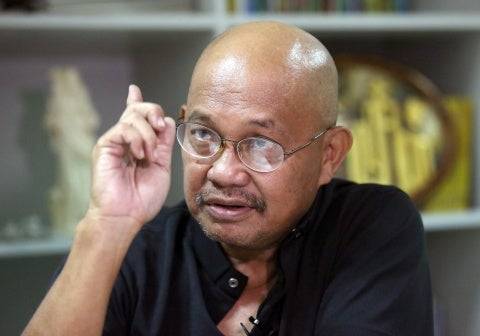
Fr. Amado Picardal, a Redemptorist priest who exposed killings by the so-called Davao Death Squad in the Philippines, died on Wednesday at age 69. Colleagues said Father Picx, as he was known, died from cardiac arrest in Cebu province, where he had been living a life of solitude and silence as a hermit.
Picardal was one of the first to sound the alarm about extrajudicial killings in Davao City on the southern island of Mindanao in the late 1990s and 2000s. This was long before the International Criminal Court (ICC) would investigate killings committed during President Rodrigo Duterte’s “war on drugs” as alleged crimes against humanity. Duterte, the longtime mayor of Davao City, was elected president in 2016 and modeled his abusive anti-drug campaign after Davao City’s.
Picardal was instrumental in helping the media and human rights organizations document the killings. The Coalition Against Summary Executions, which he helped found in 1999, played a key role in the research that led to Human Rights Watch’s 2009 report exposing the death squad. Picardal also assisted human rights groups submit information to the ICC.
Picardal helped activists, labor leaders, Indigenous peoples, and other victims of rights abuses for decades. During the Ferdinand Marcos Sr. dictatorship, he was arrested, jailed, and tortured for his work. Aside from being a prolific writer, blogger, columnist, and poet (he posted a poem online hours before his death), Picardal also walked, ran, and biked across the Philippines and Europe to bring attention to human rights.
After accusing Duterte of serious crimes, Picardal said his life was in danger, forcing him briefly into exile abroad before he returned to Philippines in 2018 to build his hermitage in the mountains of Cebu, where he lived until his death. When I last visited him in 2022, he said that he was still receiving threats but remained unafraid.
“I choose not to be silent, I choose to speak up and denounce evil in our midst. If it means [being] picked up, imprisoned or gunned down, so be it,” Picardal wrote in a blog post in 2006. “I am not afraid to suffer.”
17 notes
·
View notes
Text

A life in quotes: Ismail Kadare
Ismail Kadare, the Albanian writer who explored Balkan history and culture in poetry and fiction, has died aged 88. Here are some of the most memorable quotes from interviews he gave throughout his life
On totalitarianism
The hell of communism, like every other hell, was smothering in the worst sense of the term. But literature transformed that into a life force, a force which helped you survive and hold your head up and win out over dictatorship.
In a country of that kind, the first thing for a writer is the most important one, the most substantial one, it is: do not take the regime seriously. You are a writer, you are going to have a much richer life than they have, you are in some sense or another eternal by comparison with those kinds of people, and in the last analysis you don’t need to bother about them very much.
On Enver Hoxha, Albanian ruler from 1944 until his death in 1985
When Hoxha broke with the Soviet Union in 1962, he was ready to turn to Europe, but he was rejected, so he made an absurd short-lived alliance with China. When that went wrong he built thousands of anti-nuclear pillboxes, which he knew were useless, but he wanted to create a fear-psychosis. Albania suffered longer than any other eastern European country.
Hoxha fancied himself an intellectual and poet who had been to the Sorbonne, and he didn’t want to be seen as an enemy of writers. Of course, he could have killed me in a ‘car crash’, or by ‘suicide’, as he did many others.
On being described as a political writer
I am of the opinion that I am not a political writer, and, moreover, that as far as true literature is concerned, there actually are no political writers. I think that my writing is no more political than ancient Greek theatre. I would have become the writer I am in any political regime.
I have never claimed to be a ‘dissident’ in the proper meaning of the term. Open opposition to Hoxha’s regime, like open opposition to Stalin during Stalin’s reign in Russia, was simply impossible. Dissidence was a position no one could occupy, even for a few days, without facing the firing squad. On the other hand, my books themselves constitute a very obvious form of resistance to the regime.
On international success
On the one hand it secured protection for me in relation to the regime, on the other hand I was constantly under observation. What excited suspicion was ‘why does the western bourgeoisie hold a writer from a Stalinist country in high esteem?’
On the Albanian language
For me as a writer, Albanian is simply an extraordinary means of expression – rich, malleable, adaptable.
On books
I hated the Soviet books, full of sunshine, working in the fields, the joyous spring, the summer full of hope. The first time I heard the words ‘hope’ and ‘hard work’, they made me yawn.
The founding father of Albanian literature is the 19th-century writer Naim Frashëri. Without having the greatness of Dante or Shakespeare, he is nonetheless the founder, the emblematic character. He wrote long epic poems, as well as lyrical poetry, to awaken the national consciousness of Albania. After him came Gjergj Fishta. We can say that these two are the giants of Albanian literature, the ones that children study at school. Later came other poets and writers who produced perhaps better works than those two, but they don’t occupy the same place in the nation’s memory.
On censorship
In the early 60s, life in Albania was pleasant and well organised. A writer would not have known he should not write about the falsification of history.
For a writer, personal freedom is not so important. It is not individual freedom that guarantees the greatness of literature, otherwise writers in democratic countries would be superior to all others. Some of the greatest writers wrote under dictatorship – Shakespeare, Cervantes. The great universal literature has always had a tragic relation with freedom. The Greeks renounced absolute freedom and imposed order on chaotic mythology, like a tyrant. In the west, the problem is not freedom. There are other servitudes – lack of talent, thousands of mediocre books published every year.
I have created a body of literary work during the time of two diametrically opposed political systems: a tyranny that lasted for 35 years (1955-1990), and 20 years of liberty. In both cases, the thing that could destroy literature is the same: self-censorship.
On contemporary literature
They say that contemporary literature is very dynamic because it is influenced by the cinema, the television, the speed of communication. But the opposite is true! If you compare the texts of the Greek antiquity with today’s literature, you’ll notice that the classics operated in a far larger terrain, painted on a much broader canvas, and had an infinitely greater dimension.
All this noise about innovations, new genres, is idle. There is real literature and then there is the rest.
On being a writer
I don’t work for more than two hours a day.
Writing is neither a happy nor an unhappy occupation – it is something in-between. It is almost a second life.
I am so grateful for literature, because it gives me the chance to overcome the impossible.
Daily inspiration. Discover more photos at Just for Books…?
10 notes
·
View notes
Text
ROBERT REICH
MAR 2
Friends,
A brief word today at the end of the sixth horrific week of Trump 2.0 (before I post my weekly cartoon).
After Trump and Vance’s disgraceful treatment of President Zelensky on Friday, some of you might feel ashamed of America. You might even feel ashamed to be an American.
The proper locus of shame is Trump and Vance. I’m ashamed that they, along with Elon Musk, are now leading our nation. I’m also ashamed that their Republican lackeys in Congress are enabling and encouraging them. I’m ashamed that Democrats in Congress are so supine.
Yet I urge you not to give in to the sort of resignation or cynicism that believes nothing can be done — that we are powerless and have no choice but to watch our nation and everything it has stood for be hijacked by Trump, Vance, and Musk.
We have enormous power and many choices. When the American people understand what is happening — as they are beginning to — no Republican in Congress will be safe. Even now, majorities of independents and Democrats, and even some 30 percent of Republican voters, believe we must stand with Ukraine.
The fundamental choice has not been as stark since World War II: democracy and freedom, or dictatorship and tyranny.
Trump and his sycophants are siding with the latter. The rest of us must loudly, proudly, and boldly proclaim our allegiance to the former.
Trump is emboldening the dark forces of dictatorship everywhere. Taiwan is reporting more Chinese military drills around the island.
Europe and all free people around the world must rally at this time of American emergency. If the United States won’t seize Russia’s frozen assets and put them into an account for Ukraine to pay for further arms, Europeans must do this and let Ukraine buy from European defense contractors.
If you yourself want to help Ukrainians, you might consider United 24 (the Ukrainian state platform for donations, including many important projects); RAZOM (an American NGO, tax-deductible for U.S. citizens, that cooperates with Ukrainian NGOs to support civilians); Documenting Ukraine (an initiative that helps give Ukrainians a voice, also tax-deductible for Americans); and Come Back Alive (a Ukrainian NGO that supports soldiers on the battlefield and veterans).
A final thought. What we are witnessing from Trump and Vance and Musk — their bellicose bullying, their outright lies, their fear-mongering, their disrespect and disdain for others, their emboldening of dictators around the world — is not all bad if it awakens America.
The more Americans see and absorb the horrors of this regime, the greater the likelihood we will mobilize against it. Not all of us, of course, but the great majority.
As bad as this regime gets, it will clarify for Americans what is happening to this country, and what we must do to get it back on the track toward social justice, democracy, and widespread prosperity.
Yes, the regime is harming many innocent people. Its lawless cruelty is sickening. But there will be a reckoning.
I have always believed America is not a nation of bullies. We have protected the vulnerable, comforted the afflicted, granted refuge to those fleeing violence and persecution, and given voice to those who otherwise would not be heard.
These ideals are found in the Declaration of Independence, the Constitution and the Bill of Rights, Lincoln’s Gettysburg Address, Emma Lazarus’s poem affixed to the Statue of Liberty, FDR’s second inaugural address, and Martin Luther King Jr.’s “I Have a Dream” sermon at the 1963 March on Washington.
They connect us with previous generations of Americans who risked everything —some of whom sacrificed their lives — to preserve democracy and achieve a greater good.
Do not feel shame in America. Feel pride in the ideals we share. Feel honored that you are an activist warrior on the right side of history. Feel strength in our conviction. Feel power in our cause.
We will prevail against Trump — against his bullying, his brutality, and his barbarity.
5 notes
·
View notes
Text
Getting away from Mega Man for a bit, I've been mulling over an Archie Sonic thought. One that covers EVERYBODY's favorite subject- the Overlanders!

cricket chirp
Heh, yeah, that's to be expected, but what can I say? I like to dwell on stuff. Anyway, one of the least popular and most redundant reveals in the old Archie Sonic book was that Overlanders were in fact a separate species from humans and were essentially 'Mobian Humans' the way Sonic is a 'Mobian Hedgehog'. This came about as a way to sudden explain the presence of 'humans' when the Sonic Adventure rolled around, but the supposed difference between the two species- humans having five digits while Overlanders have four- was never, ever consinstently enforced, and it remains one of the most unneeded, self-inflicted injuries in the book.
Likewise, with the emergence of said humans and the United Federation, a curious irony arises in which it seems that, according to the map, the heart of the United Federation is located in what used to be Europe rather than in what used to be North America. It seems like a puzzling development given that you'd expect these 'descendant' nations to occupy the same rough space as their predecessors, so, what gives?

Well, I had me an idea that can explain that, while getting rid of the whole 'Overlanders are Mutant Humans' thing… while explaining the origins of Overland, and how the Overland eventually led to the United Federation.
Anyway, it goes like this.
As You Know, in the face of the imminent Xorda Genocide in the 21st century, the governments of the world created a desperate attempt to preserve humanity in the form of the Hidden City Initiative, which resulted in a number of underground cities built ala the Vaults from Fallout. The idea being that a fraction of humanity would be saved and wait out the storm of the Xorda.

Eventually the Xorda arrive and do their thing, gene-bombing the earth into oblivion and reducing all life on the planet into primordial soup. But then, unexpectedly, life re-emerges from this soup, but life forever changed as Mobiankind emerges from the ashes of the old Earth. Their evolution hyper-accelerated, over the course of ten thousand years Earth transforms into Mobius, speedrunning through its own age of Dinosaurs (Mobosaurs), Ice Age (which gave us Mogul), to the rough 'modern' age, along with the emergence of phenomena such as magic and the like.

And all the while, humanity slumbers, deep in the recesses of the Earth… but one day, one of the Hidden Cities suffers a malfunction, and wakes up ahead of schedule. This Hidden City is located under what used to be New York, and its people are forced to adjust to life lived under ground. The old norms of democracy and representative government are suspended in the name of survival, and over the generations the society of this Hidden City becomes a centralized dictatorship with far less emphasis on individual rights. Over time, the surface world takes on a mythical, 'Promised Land' kind of place within the culture of the humans, and is referred to as The Overland. The goal of returning to the Overland is what binds the humans, and one day their hard work pays off when they at last get confirmation that the surface is safe for them to inhabit.
The humans proceed to migrate en-masse to the surface of Mobius, in what used to be the East Coast of the United States. They proceed to spread out and lay claim to the lands, which they naturally dub 'The Overland', and themselves Overlanders. They begin making cities and communities and building industry and ships to explore the rest of the planet… and of course, trouble starts brewing within the nascent Overlander civilization. Within the society of the Hidden City there was always a sizable faction of people who believed that, once humans returned to the surface, there would be a return to the democratic government of old since they were now living in the land of plenty and wouldn't need to live such controlled lives.
As you can guess, the people who had grown powerful from the Status Quo had other ideas. Overlander civilization becomes split down the middle between the Reformists, who believe old measures are no longer needed and were only ever meant to be temporary, and the Traditionalists, who see no reason to change a way of life that had safeguarded everyone during 'The Dark Age'. Things get tense, and it seems like things might erupt into civil war. Then, news comes back from scouts and explorers about a new land mass off the coast of what used to be Europe, one that didn't exist in the old maps.
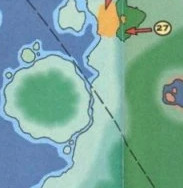
A compromise is reached between the two factions- those who support he Traditionalists will remain in Overland, while the Reformists will re-settle in the new lands. A mass exodus ensues, and those humans who migrate across the sea start anew in the new lands, and in time they will eventually become the United Federation as they establish contact with other re-emerged human civilizations across the former Old World.
And that's the story of how the USA was reborn in Europe! Funny how that works, huh? ID
14 notes
·
View notes
Text
Sad story alert featuring Charles Lindbergh:

Colonel Charles Lindbergh, along with being a Nazi sympathizer and into eugenics, also believed in the Watson method of parenting: parent children, even babies, like little adults.
I just read a biography about his wife Anne Morrow Lindbergh. Anyway he instructed Anne to do things his way and not to cuddle the kids.
(Book: Anne Morrow Lindbergh, Her Life by Susan Hertog, 1999. Susan spent time with Anne).

The kids had strict schedules.
Bedtime was before he got home in the evening.
Their first child, Charlie, would toddle over to him and Charles would push him away literally. He took a cushion and knocked him down. He did it over and over until Charlie gave up.

Charles had his wife Anne learn to be his copilot after they married, and she was an aviator in her own right. In fact she won medals for her accomplishments in flying and wireless communications.
Not to mention she was a successful author.
But Charles would make Anna go on long trips while she was pregnant and her kids’ babyhoods. Especially the babyhood of Charlie.
When they got home he didn’t recognize his parents.
When Charlie was 20 months old he was kidnapped and murdered. (The Lindbergh Baby case)

Charles got over it suspiciously fast. He may have had something to do with it since Charlie was a sickly child with rickets.
(Actually there’s another book out on the subject. Called “Suspect No.1, by Lise Pearlman, 2020. I’m curious….)
Charles Lindbergh was a prankster too but his jokes were cruel and sadistic.
He had hid baby Charlie for 30 minutes in a closet at least once while Anne and the Nanny searched frantically for him.
For example , in college his roommate almost died because Charles gave him a glass of gasoline instead of water.
Charles got over Charlie’s death very quickly.

Anne did not. She died in 2001 at age 94, haunted forever.
She wasn’t one to talk about Charlie until her death.
She had 6 kids total with Charles and she didn’t discuss Charlie.

When the other kids were teenagers Charles would travel and be gone for months at a time.
When he came home he immediately became colonel Lindbergh and ordered his family around like troops.
When he would finally leave again Anne and the kids could breathe.
Charles was fond of saying “this is not a democracy, this is a dictatorship!”
2 years after Anne’s death, it was discovered that Charles Lindbergh had 3 secret families and 5 children in Europe.
Anne never knew this. But maybe she knew something…no one’s sure.
Charles purposely had these families because he believed his superior Aryan blood should be spread after the Germans lost WWII.
Anyway, it’s a fascinating story about Anne. I don’t know what to really think of her since she kept being loyal to Charles and letting him order her around, and people suffered. They had influence even though many people thought them villains around the war.
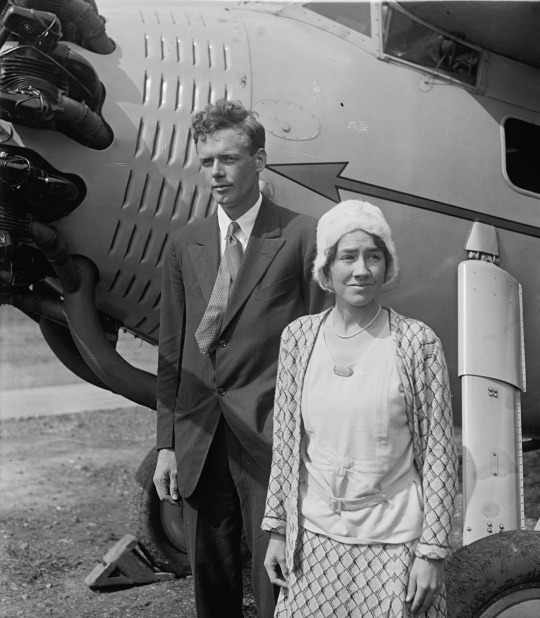
But she was always begging God for forgiveness for Charlie being taken under her nose and her complicity with Nazi party in the 30s. Her whole life was accommodating Charles.
She was a victim of Charles too i think. But her life revolved around him, so she couldn’t say this.
I don’t know. She was very complicated.
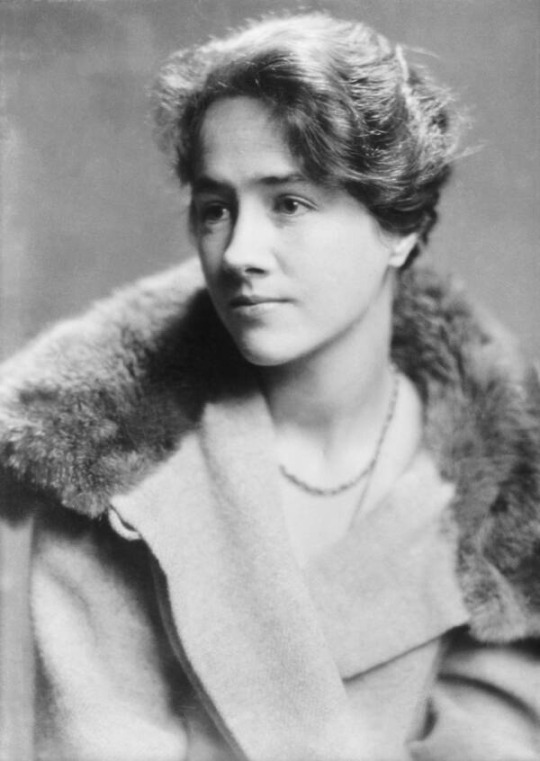
One more thing. When Charles died of cancer in the 70s, he wanted a natural burial in Hawaii. He wanted room for Anne for when her time came.
She was never buried with him, she was cremated. I hope she found peace, I do. I’m not sure she did.
Rest in peace baby Charlie . He died 92 years ago, March 1 1932.

#storytime#history#charles lindbergh#anne morrow lindbergh#the spirit of St. Louis#the Lindbergh baby#1920s#1930s#the aviator’s wife#the aviator#the author#Susan hertog#lise Pearlman#biography#suspect no. 1#Watson method#wwii#aviation
6 notes
·
View notes
Text
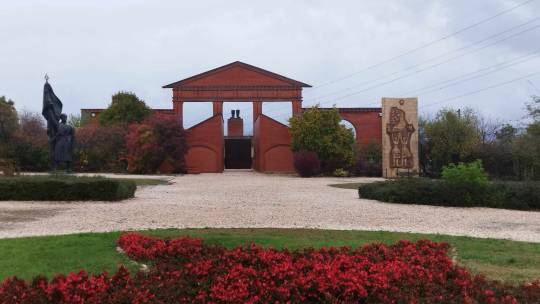
Memento Park is a unique attraction of Budapest. The Statue Park, the Barrack Cinema, the Photo Exhibition, the Stalin’s Grandstand, and the Storage Showroom offer a complex experience for all ages.
The place is Central Europe’s first thematic museum that reminds people of a dictatorship and its fall. Memento Park, combined with the nearby attractions is a pleasant leisure and excursion destination.
8 notes
·
View notes
Text
Two Assassin's Creed Games I'd Love to Play
So, I replayed AC: Unity recently, and after collecting my thoughts on the story and setting, there are two AC sequels I'd love to see but we probably won't get them:
A sequel to ACIII
Much like how AC: Brotherhood expanded on Ezio's character and story, I think it would be worth returning to Conner Kenway in a sequel game that takes place sometime in the 1780s, maybe 1786 right as Conner is turning 40.
This game would feature Shay Cormac as the primary villain of the story--after all, while Shay was in Europe hunting down Charles Dorian, Conner was wiping out the colonial Templar Order---so it would make sense that Shay would make good on the final words of his own game and return to lead the "American Rite."
Shay also knows the location of the homestead, so it would make sense that he'd attack the homestead to try and stamp the brotherhood out, forcing Conner to move headquarters to another location and start anew.
In the background, this game could cover a continued conversation about the role of freedom in society, and the balance between government and personal freedom etc. More tangibly, you could cover the transition between the Articles of Confederation and the US Constitution.
The obvious end of the game would involve Conner eventually defeating and killing off Shay in a harrowing final fight. While Shay makes for a crap protagonist, he'd make for an interesting villain: Especially because he could do anything from doubling down on Templar dictatorialism, or he might even hold a fairly nuanced take on the entire ideological war.
2) A follow-up to AC Unity
A game that returns to Arno's perspective, AC Unity II would take place starting in 1812. The introductory story would see Arno hunting his father's killer in America, only to quickly discover that Shay had been killed before Arno even joined the Assassins in 1792. Arno would witness the beginnings of the War of 1812, and would either choose to stay and help the American Assassins weather the war,
Or he'd take Mentor Conner's advice and take the next boat to France. While in America, Arno would be engaged in several philosophical conversations with Conner---underscoring how the Age of Enlightenment has been a unusual time for both the Assassins and Templars, but also underscoring that the American and French Brotherhoods have two slightly different interpretations of their creed. Where the Americans are more optimistic and support democracy, the French Brotherhood has continued to experiment with a truce with the Templars, and they are working together to create an enlightened dictatorship through Napoleon.
Naturally, Conner disagrees with Arno about their approach, but he's not so opposed that he'll do anything to stop Arno. Rather, Conner simply warns Arno that power corrupts, and corruption is the weakness of all dictators: The Templars especially.
Arno returns home to France and we're introduced to his new reality: Arno has spent that last 20 years carrying Elise's last wish: Co-existence between Assassins and Templars. He's a personal friend and advisor to Emperor Napoleon, and he's even friends with a few of the "White Templars," The Templars who moderate views allow them to associate with Arno.
But quickly, Arno begins to pull at the threads of this fragile alliance and eventually he finds out the truth: Napoleon is corrupt, and even being Emperor has not satisfied his need for more power. The Templars are corrupt along with him, and many of those Arno thought of as friend have been working behind his back to rebuild the Templars and return to the old ways.
Arno feels a great deal of conflict throughout the game: He feels great guilt for having slept for so many years on the obvious truth of their corruption. He also ends up very broken hearted, as several of his new targets are old friends, and the sting of Arno's betrayal poisons every word exchanged.
Arno revitalizes the Assassins in France, and works to dismantle Napoleons Empire---I don't have a specific end to this idea in mind, but I think it would be cool to have Arno visiting Napoleon on Elba years later. Their story would also focus on a friendship lost: Arno and Napoleon would have been like two brothers, where Arno often served as Napoleons left hand. Their final conversation on Elba would underscore their mutual heartbreak, their desire to be friends again, the impossibility of their friendship in the face of Arno's betrayal, and Arno's resolve to not apologize for his betrayal, knowing in his heart that deposing Napoleon was the right thing to do.
And of course, as soon as Arno leaves, we could get a little last second cliffhanger/cameo that hints at Napoleon's later escape from Elba.
11 notes
·
View notes
Note
Hello! Centuries after Jewish people were expelled from Portugal and Spain, Portugal allowed them to return, but I don't know if Spain did the same. I read your post about Jews in Catalonia, and was wondering if some came back and if there is still a Jewish comunity there today? :o
Yes, the same happened, but they are still few in number.
Some Jewish people returned to Iberia in the 20th century. It might come as a surprise to many, but it was during the proto-fascist dictatorship of Primo de Rivera and during the fascist dictatorship of Francisco Franco when more Jewish people moved to Spain.
Philosephardism became popular in the early 1900s. That's when the first campaigns to bring Sephardi people close to Spain started, many of them led by the politician Ángel Pulido Fernández.
The first campaign was in 1904, but it was more about creating shared organizations with Sephardis in Northern Africa and not so much migration yet. In 1910, the King of Spain Alfonso XIII founded the Spanish-Hebrew Union (Unión Hispano-Hebrea), which saw 4000 people sign up as members in the Moroccan protectorate (remember that at this time Morocco was a protectorate of Spain). This Union created schools for Sephardi children in Morocco and the Balkans to teach them Spanish.
The moment where many Jewish people migrated to Spain, creating a significant Jewish community for the first time since the Middle Ages, was during the First World War (Spain was neutral in WW1, so it was a safe area compared to most of Europe). Barcelona was one of the places that received the most Jewish immigration in this period: about 1,000 people, most of them coming from Austria-Hungary and some from France.
More continued to migrate to Spain during the Primo de Rivera dictatorship (1923-1930), because in 1924 the dictatorship made a law that all Sephardi people could get the Spanish nationality. According to the Comunitat Israelita de Barcelona (the association of Jewish people of Barcelona), in 1936 there were already 5,000 Jewish people, more than half of them newly arrived from Poland and Germany, and others having arrived from Austria, Hungary and Romania.
As expected, the immigration continued during the Second World War, escaping the Holocaust (even though Spain gave support to the Nazis and sent some legions to fight against Russia on Germany's side, it was mostly neutral in WW2 because the Spanish Civil War had just ended, leaving the country in extreme poverty and destruction). The regime said that they were only allowing the Jewish people to cross Spain on their way to somewhere else and that they didn't want them to stay, but after all they weren't really checking on each person, so some stayed.
Even with this situation, make no mistake: Jewish people were not well seen during the dictatorships. It was mandatory to be Catholic, and everything bad in the world was attributed either to the "separatist reds" (national minorities, independentists, communists, anarchists, anticlericals, atheists) or to a "Judeo-Masonic conspiracy" (Jewish people and Freemasons), thought to be working together to destroy Spain and the Christendom. This wasn't just a matter of the early years, no: it was a constant reasoning during the whole dictatorship in the schools, media, speeches, everything. Even in Franco's very last public appearance (October 1st 1975, celebrating his 39th anniversary since he was "appointed" as dictator, when the last week there had been demonstrations in different places around Europe against the death sentence that the regime had condemned some political dissidents to), he blamed the eternal communist, Freemason, Jewish international conspiracy for those demonstrations.
Despite their antisemitism, after the Second World War the fascist dictatorship of Spain also used the fact that they were "helping" Jewish people as a propaganda point to get the sympathy of Western countries, as a way to show that they had sided with Hitler and Mussolini because of a common hatred of communism but not because they hate Jewish people. This way, the dictatorship hoped to be accepted as a normal country, join the UN, with no sanctions. And it worked, mostly because the USA was promoting fascist countries as a way to counter communism.
In the late 1940s, the dictatorship allowed private individual worship to any religion (you could pray to whoever in your private home), even though everyone still had to take part in the Catholic rites in public. In 1949, Franco officially recognised the Barcelona Israelite Community, who opened a synagogue in Barcelona in the year 1954. This was the first synagogue in all the state of Spain since the Jewish people were expelled or forced to convert in 1492.
In the 1950s, the biggest Jewish immigration wave to Spain arrives from Northern Africa, and in the 1960s from South America. In 1968, the Vatican and Spain symbolically revoked the 1492 decree of expulsion. After the end of the dictatorship (1977), there is freedom of religion in Spain.
Nowadays, there is a small but existing Jewish community resulting of these waves of immigration throughout the 20th century. They are only a few thousands, so it doesn't show up in any religion statistics, but they are there.

Percentage of the Spanish population that identifies with each religion. Data from Observatorio del Pluralismo Religioso de España.
#ask#història#religió#jueus catalans#religions#history#20th century history#jewish#spain#european history#history of religion#franquismo#ww1#ww2
33 notes
·
View notes
Text
rambly post about eroica brazil plot under the cut
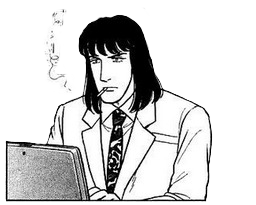
a while back was discussing with my friend the idea of a FEWL plot taking place in brazil, either the late 70s or early 1980s. i wasn't really able to conceive of a plot that wasn't heavy with the spy politics stuff, first because i just enjoy those more, and second because excluding the politics or leaving it to happen in the background, kind of like happens in the insha'allah chapter, felt kind of wrong to me (two european randos breaking into a historical building to steal national treasures.. no thank you)
context 1: brazil was in a (US backed) military dictatorship since 1964, and would go on until 1985, and direct elections wouldn't happen until 1989
context 2: me and my friend call The Organization (you know the one) as HATO as an inside joke lol
for eberbach's side, i thought of something along the lines of: despite not being north america or even being in the north, the brazilian government is on the talks to join HATO. the press-given reason is to protect the country of the communist "threats" of the guerilla groups of the 1970s, and the real motive being to fill brazil with even more US and EU military bases (i'm pretty sure there were ones already during that time, unsurprisingly), maybe even put nuclear missiles in brazil, pointed right towards cuba
and y'know, at first he does not give a shit, he has never been outside that part of europe, central asia (i think is the right term) and north africa before, but slowly starts to see the motives and the people arround him as shady, especially the weird brazilians who keep walking up to him and asking about his family and the "german military"
and then with dorian, it was a little harder for me to think about, but nevertheless more fun. as much as he likes medieval and byzantine artworks, which are less of the "standard" european art we're used to, he doesn't like anything modernist, which is what brazil is most famous for, and frankly, for very good reasons (MUCH prettier than modernist european art too mind you)
nevertheless, i'd love to see him be chased after and then trick some bootboys over these two works by pedro américo lol (hamlet's vision and night accompanied by the twins of study and love, something like that)
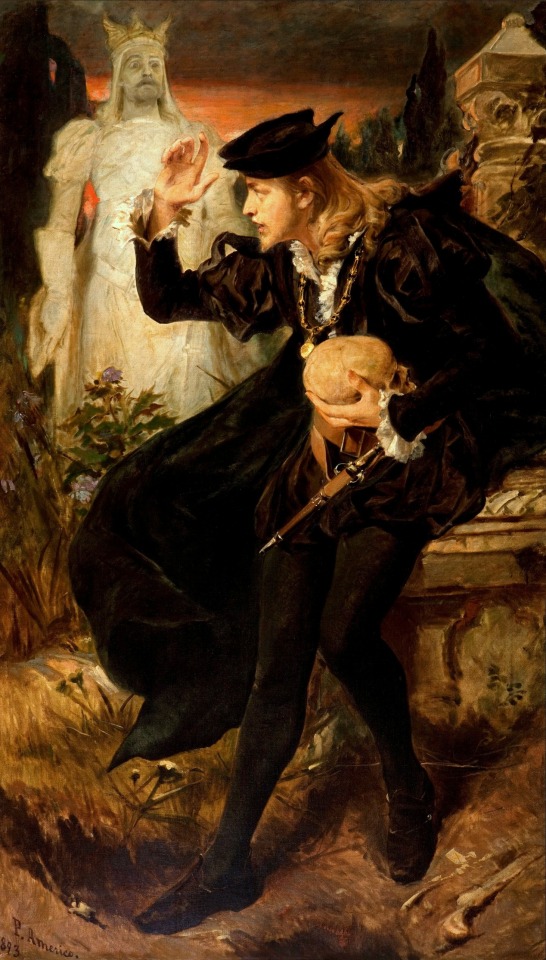
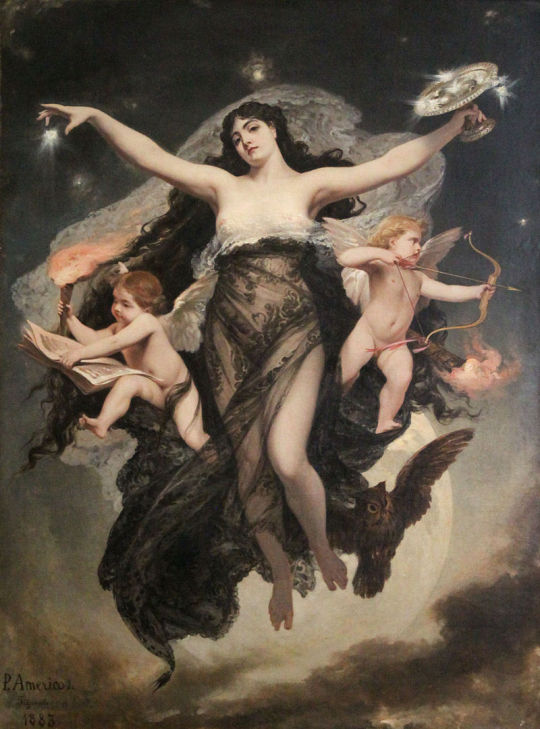
and on a more intimate level well. i also discussed it with my friend and i loved the idea of dorian creating a commune on whatever castle he's staying in, a big imperial-age (19th century for us lol) villa/castle with a fuckass giant pool, maybe a view to the Christ statue (the Parque Lage in rio comes to mind), and besides all of his eroica gang guys he starts hosting brazilian artists/musicians there, falls in love and starts a relationship with one of them, and then, sadly, he leaves
i feel like it could be a good story... could be romantic, could be thrilling, even in the depressing and hopeless setting of the regime. maybe 75 year old aoike should visit brazil someday
also i literally live in são paulo but i could not think of a story taking place here lol. the aesthetic is fully the man from rio
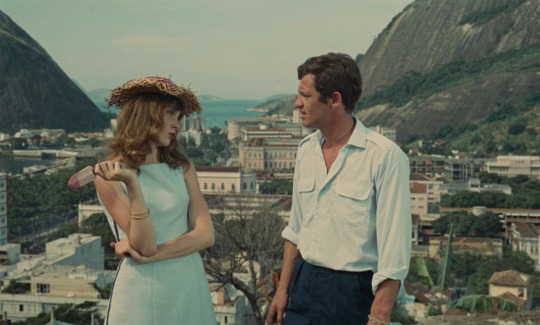
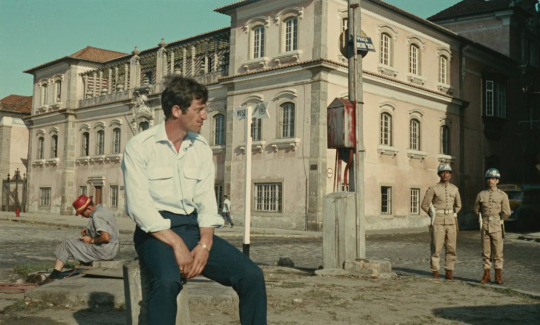
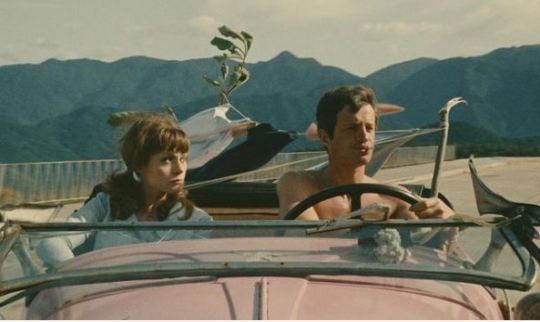
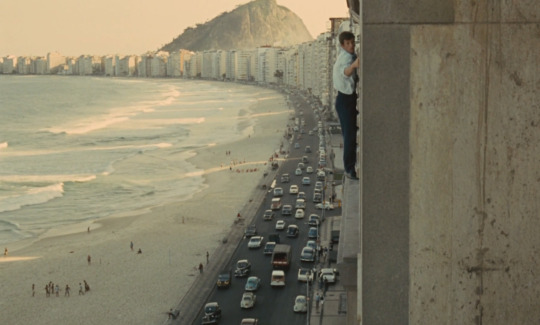
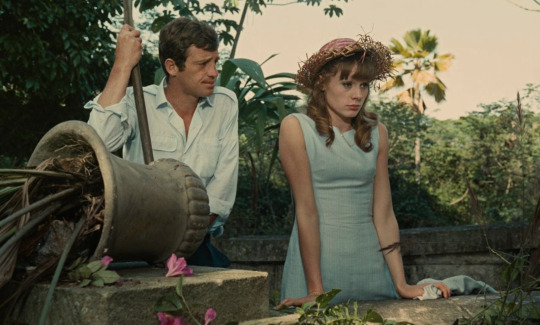

7 notes
·
View notes
Text
“It’s not hard to imagine how badly Vitale’s question must have wounded Shklovsky in his dotage. This was, after all, the same Shklovsky who had waged an artistic revolution—one that paralleled but did not always coincide with the Bolsheviks’—with no less at stake than the liberation of human consciousness; the same Shklovsky who had seen at least two brothers and most of his friends (an illustrious literary crew including Vladimir Mayakovsky, Osip Mandelstam and Yevgeny Zamyatin) disappeared, executed, or driven to suicide or exile by the Soviet establishment; the same Shklovsky who had twice been injured in battle fighting for a revolution that had already begun to hunt and humiliate him; who endured cold and hunger and exile and squirmed through years of silence under the censor’s heavy thumb; the same Shklovsky who spent most of his intellectual life championing the emancipatory power of the novel and fighting to blast it—and all of literature and even, yikes, reality—out of subservience to a host of dumb and arbitrary masters.
The establishment, him! Shklovsky had from the start fought for a notion of art directly opposed to socialist realist pieties, one that hinged on the need to push beyond established models, to make things strange so that we might see the world afresh in its cruelty and splendor. He had been at odds not just with the bureaucratic state that congealed in the wake of the revolution, but with stasis itself, with the crust that the world of things deposits on our senses, with routine’s unending murder of the real. Innovation must occur in art, Shklovsky had written as recently as 1970, “because humanity fights for the expansion of its right to life, for the right to search and attain new kinds of happiness.” But age had mellowed the insurrectionist. Shklovsky called Vitale a few hours later to apologize: “My God, I made you cry, forgive this crabby old man.”
(…)
What emerges from these works is a group portrait of Shklovsky’s Formalism—even the name dries the mouth—that bears little resemblance to any school of literary criticism that has arisen in the West in the last century or, well, ever. It was born not in the academy but out of the literary avant-garde and alongside the Russian Revolution. Ironically, given the Formalists’ insistence on literature’s divorce from worldly events, it arose without even a hair’s distance from the tumult that rocked Europe for most of the early twentieth century. When the revolution erupted in February 1917—“it was like Easter,” Shklovsky would recall, “a joyous, naïve, disorderly carnival paradise”—he was already an insurrectionist, though of a different sort from Lenin or Trotsky. Years later, when Vitale asked him what the revolution had meant to him, Shklovsky would answer, “the dictatorship of art. The freedom of art.”
At the beginning of the 1910s, Shklovsky had befriended the young Futurist poets Velimir Khlebnikov and Vladimir Mayakovsky and, while still a student, had become the Futurists’ theoretical champion. The world was sick and palsied—who can now deny it?—so thoroughly smothered in vestigial tradition and used-up forms that it couldn’t even be properly perceived. “Do something undreamed-of,” demanded Khlebnikov, “strictly new, you horses pulling the hearse of the world!” Out of the radical poetics of the Futurists, Shklovsky and a few comrades founded Opoyaz (an acronym for “Society for the Study of Poetic Language”), the nucleus of the critical movement that would later be called Russian Formalism, in the kitchen of an abandoned St. Petersburg apartment.
(…)
These and other sundry obstacles, all of them oriented toward rupturing the smooth flow of narrative, are tools in the service of what Shklovsky called ostranenie, which is variously translated as “estrangement,” “defamiliarization” or simply “making strange.” In Theory of Prose, Shklovsky would distinguish between “recognition” and “seeing.” Ordinary perception falls into the former category: we don’t see objects so much as recognize them according to pre-existing patterns of thought. The world arrives “prepackaged” and passes us by without a graze. “And so, held accountable for nothing, life fades into nothingness. Automatization eats away at things, at clothes, at furniture, at our wives, and at our fear of war.”
The point for Shklovsky was to find a way to shake ourselves out of this collective stupor so that we might see the world in all its startling brightness and, presumably, act on what we see. (An unacknowledged politics hides behind Shklovsky’s poetics, a quasi-anarchist insistence on permanent revolt, but that is an argument for another essay.) For this, “man has been given the tool of art,” which—and this is where ostranenie comes in—employs various tactics to defamiliarize the world, to allow us to see it as if for the first time. If it is anything, art is oppositional and insurrectionary, and literature an authorial conspiracy to overthrow anachronistic modes of thought. “Art,” Shklovsky wrote in A Sentimental Journey, “is fundamentally ironic and destructive. It revitalizes the world.”
This position leads him to some surprising places: first, to a notion of literary change based on rupture rather than influence and inheritance. Art changes not out of fashion or habit, but because it must. New forms are created when the old ones become as sclerotic as the ones they replaced. (No wonder Shklovsky made the Bolsheviks edgy.) Second, the practice of literary criticism involves a quest for ostranenie that parallels the artist’s. (In 1972, the Marxist literary theorist Frederic Jameson would somewhat snidely call Shklovsky’s critical works, of which he had not read many, “little more than an endless set of variations” on the idea of ostranenie.) If the critic is to see the object of his study sufficiently to analyze its workings, he must “extricate” it “from the cluster of associations in which it is bound.” So while language may be subject to all the usual social and economic forces, literature, if it is to be seen at all, must be looked at on its lonesome.
From there, Shklovsky leaps a few wide boulevards and, post-extrication, tosses out all the scraps from which the work emerged: “No more of the real world impinges upon a work of art than the reality of India impinges upon the game of chess,” he wrote in Theory of Prose with characteristic modernist élan. This means that any erstwhile “content” we might imagine clinging to the work (whatever a book is ostensibly “about”) is no more than a function of “form,” of whatever combination of stylistic devices the author has brought to bear. Plot is mere structural play.
If this sounds counterintuitive, it was—and remains—an intensely fruitful insight. Shklovsky’s audacity gave him the freedom to take apart Cervantes and Sterne, Gogol and Tolstoy, with a brilliance that still dazzles ninety years later. And it allowed works of literature to become visible, not as natural objects like fingernails or trees, but as complex creatures of artifice, as purposeful forms of play. This notion did not go down smoothly. As the ’20s dragged on and Soviet aesthetic attitudes became more rigid, art had only two options: it could be an organic growth of proletarian consciousness, or counterrevolutionary poison. Shklovsky’s Formalism made him, in the words of an unnamed KGB interrogator quoted by Vitale, “an enemy of the real world and [of] socialist realism in literature.”
(…)
But literature, the young Shklovsky insists, is its own planet, bound by the rules that it creates. “Art,” he wrote in Zoo, “if it can be compared to a window at all, is only a sketched window.” Its point is not to accurately reflect this same old cruddy, shrink-wrapped world, but to steal us new sets of eyes, to forge new and unimagined senses. This is art’s one virtue, its promise and delight. And the novel, call it dead or alive, is not a thing among things of a certain weight and size, obliged to obey established formulae. It is a weird box of almost bottomless openness, a compact revolution in a cloth and cardboard binding. Or, if you prefer, in pixels.
(…)
But Shklovsky lived long enough (outliving many of his persecutors) to do some rethinking. By the time Vitale knocked at his door in 1978, he had published Bowstring, in which he displayed an earnest effort to sort through the contradictions of his youth. “Back then I used to say that art had no content, that it was devoid of emotion,” he marvels, “while at the same time I wrote books that bled.” Through analyses of Homer, Sophocles, Shakespeare, Dostoevsky, Rabelais, Updike (yes, him) and, as always, Sterne, Cervantes and Tolstoy, he lays out a heretical, softer and less formal Formalism. Ostranenie, Shklovsky writes, “can be established only by including the notion of ‘the world’ in its meaning. This term simultaneously assumes the existence of a so-called content.” He holds tight, though, to the importance of contradiction, anachronism, disharmony, which provide the needed tension from which art derives its powers. “If one can say that imagination is better than reality, art is even better,” he explained to Vitale, “because it’s the dream of every structure’s collapse and at the same time the dream of the construction of new structures.”
(…)
None of it adds up. But that’s OK, that’s the whole point, that’s what we’re doing here, even if it hurts. Especially when it hurts. Shklovsky reassures us:
Unity, reader, is in the person who is looking at his changing country and building new forms of art so they can convey life… Browse through our works, look for a point of view, and if you can find it, then there is your unity.
I was unable to find it.”

“September I5, 1988
Dear Ken,
Do you know anybody who can translate Russian to English? (I am thinking of your faculty friend who sent you - and me - the info on Viktor Schklovsky.) What I need to know is how he would translate the two famous opposed literary devices of Schklovsky. The words: obnazhenie and ostranenie. I suspect they mean defamiliarization and overfamiliarization, but don't know. How about a hand? Ain't no Russians here. I greatly prize "Pragmaticism is an Existentialism?"
All best,
Walker [s]
P.S.: The reason these Russian words are important to me is that they fit in well with my notion of the evolution/devolution of symbols, so that a thing/event can come to be cancelled by a symbol/word, hardened through over-familiarity into what Gabriel Marcel called a “simulacrum” - same event/thing can be recovered in times of disaster or great poetry - simulacrum broken, being revealed as being, etc. Thanks, WP”
#shklovsky#victor shklovsky#literary criticism#russian formalism#bolshevism#soviet literature#russian literature#mayakovsky#obnazhenie#ostranenie#percy#walker percy#ketner#kenneth laine ketner#marcel#gabriel marcel#simulacrum#being
8 notes
·
View notes